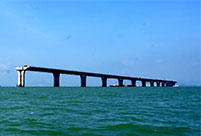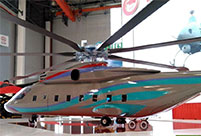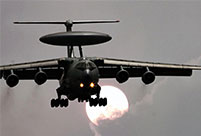

Websites may pay the fee
Jiao Yuwei, an aviation major at Huahang Aviation A School located in Langfang, Hebei province, says that although he studies aviation, in-flight Wi-Fi is still quite new to him.
"I'm taking a wait-and-see attitude to this. My major concern is the high price but low network speed, " says Jiao. He hopes to get a chance to try in-flight Wi-Fi but he is not willing to pay for it.
Similarly, others also see the price of onboard Wi-Fi as their biggest concern.
Jiao adds that the Chinese travellers might not be willing to pay for Wi-Fi, as free Wi-Fi is almost everywhere on the ground, so it may take a while to get people used to the payment policy.
Chinese airlines haven't fixed a price for in-flight Wi-Fi services, or a method to calculate the fees.
Geng says that for Air China, pricing according to connection duration and net flow are both possible. They will refer to foreign airlines' pricing, which ranges from several dollars per hour to several dollars a minute.
"But we are also talking to partners who have stationed themselves on our website, discussing a method in which they can cover the high Internet fees. I believe that will be the best 'pricing' for passengers," says Geng.
To make his point about pricing, Geng tells the story of a woman who took a flight and sent an e-mail with a 50Mb attachment via the in-flight network.
"She fell asleep, and when she awoke, a bill of $1,200 was waiting for her," says Geng. "It sounds ridiculous but it highlights the problem for us, which we will try to solve."
When will it be available?
Besides Air China, Chinese airlines such as China Southern Airlines and China Eastern Airlines are also working on their in-flight Wi-Fi networks.
China Southern Airlines has been doing trial flights with an Internet connection supported by KU-Band on the Beijing-Gungzhou and Beijing-Shanghai routes and China Eastern Airlines is also conducting similar trials.
Geng says that it took them 15 days to equip the first Air China plane with in-flight Wi-Fi. But as they got more experience they now need just three days to refit a plane
However, this does not mean that Air China can finish refitting all its nearly 500 planes soon.
Geng says that several government departments are involved in-flight Wi-Fi, such as the Ministry of Industry and Information Technology, the Civil Aviation Administration, and even the State Administration of Radio, Film and Television.
"We need to get permissions... which can take a really a long time," Geng, adding that the process of promoting in-flight Wi-Fi will to a big extent depend on the departments' permissions.
Geng stresses that safety is always the most important thing for flights. As inflight Wi-Fi has not been undergoing trials for a long time, Chinese airlines need more data to ensure the safety of planes and passengers.
"The process will probably take a year," says Geng. "But what I can promise is that the service that Air China provides to passengers ia 100 percent safe."
Though onboard Wi-Fi is still a novelty for Chinese passengers, most travelers showed a strong interest when told that Wi-F is available onboard.
But while tweeting, checking e-mail and shopping online in the plane sounds attractive to them, some passengers have concerns.
Speaking of onboard Wi-Fi, Huang Jie, an employee with China Aerospace Science and Industry Corporation, who flies frequently, says: "Some of the planes I flew on were equipped with Wi-Fi connected to the LAN, but its functions were limited and I'm not used to it. I would rather watch a film downloaded to a memory device and get some rest like before."
Considering the stresses of business trips, Huang says she cares more about whether she can rest well while flying, worrying that once in-flight Wi-Fi is widely used she will have to work even while flying.
 |
 Top 10 nominated designs at BJDW
Top 10 nominated designs at BJDW Fashion show staged in Forbidden City at night
Fashion show staged in Forbidden City at night Construction of HK-Zhuhai-Macao Bridge enters final stage
Construction of HK-Zhuhai-Macao Bridge enters final stage Model of heavy-lift copter makes debuts at Tianjin expo
Model of heavy-lift copter makes debuts at Tianjin expo Art photos of Chinese beauty in Han Chinese clothing
Art photos of Chinese beauty in Han Chinese clothing Stunning photos of air show in China’s V-Day parade
Stunning photos of air show in China’s V-Day parade Models change clothes on street in Hangzhou
Models change clothes on street in Hangzhou Charming Chinese female soldiers
Charming Chinese female soldiers Beauty vs. muscular man
Beauty vs. muscular man Rising to the challenge
Rising to the challenge Rand report echoes Cold War mind-set, overstates threats
Rand report echoes Cold War mind-set, overstates threats Inland nuke plants crucial to energy future
Inland nuke plants crucial to energy future Communist confrontation
Communist confrontationDay|Week